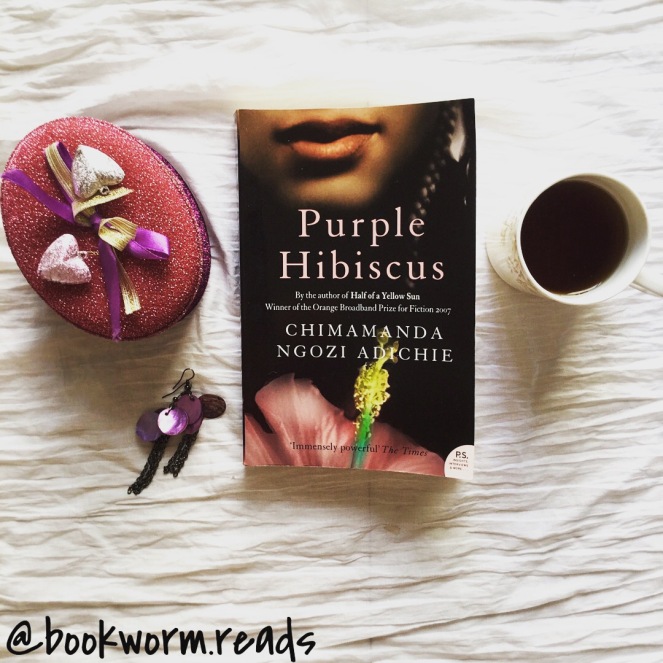Author: Chimamanda Ngozi Adichie
Publisher: Harper Perennial
Published: 2004
Language: English
Rating: 4/5
Blurb:
Fifteen-year-old Kambili lives in fear of her father, a charismatic yet violent Catholic patriarch who, although generous and well-respected in the community, is repressive and fanatically religious at home. Escape and discovery of a new, liberated way of life come when Nigeria is shaken by a military coup, forcing Kambili and her brother to live at their aunt’s home, a noisy place full of laughter. The visit will lift the silence from her world and, in time, unlock a terrible, bruising secret at the heart of her family life.
An extraordinary debut, Purple Hibiscus is a novel about the blurred lines between the old gods and the new, childhood and adulthood, love and hatred- the grey spaces in which truths are revealed and true living is begun.

Review:
The novel opens with the line ‘Things started to fall apart at home..’ in reference to Chinua Achebe’s novel ‘Things Fall Apart’, showing the influence of his writing on hers.
Enters Kambili our 15-year-old narrator, who is seen as a mute, naive spectator to the events in the story. On the outside we see her living a life of luxury, by the virtue of being born to a rich father who owns factories and even a newspaper. But as we are further acquainted with the family, we see a dark side to it, an oppressed set of members living under constant scrutiny, domestic violence and illogical sanctions. Eugene, her father, appears to be a tyrant, who rules with an iron fist, owing to his religious fanaticism; a man who does a lot of charity and helps people as long as they are followers of his faith, Totally brainwashed by the white Catholic priests, he tries every possible way to appear more white in his mannerism and outlook while trying to sever ties with his Nigerian lineage and traditions.
Eugene, her father, appears to be a tyrant, who rules with an iron fist, owing to his religious fanaticism; a man who does a lot of charity and helps people as long as they are followers of his faith. Totally brainwashed by the white Catholic priests, he tries every possible way to appear more white in his mannerism and outlook while trying to sever ties with his Nigerian lineage and traditions.We also have Kambili’s mother Beatrice, and elder brother Jaja as the victims of father’s dictatorial rule.
The major event in the story is seen as Kambili and Jaja going away on a holiday at their aunt Ifeoma’s place, who is more balanced with her culture and religion. They spend time with their cousins Amaka, Obiora and Chima and witness a home environment of happiness and freedom. As the story progresses we see them going through changes; Jaja learning to question his father’s behaviour and Kambili turning into a more confident, smiling woman, who comes to terms with her newly found sexuality.
Purple Hibiscus can be seen as the symbolism of blossoming into womanhood or entering a new phase of life. The book gives a wonderful insight into Nigerian culture, tradition and cuisine. Adichie has meticulously penned down the Nigeria during the political unrest, after a coup and the various struggles of the countrymen. After effects of colonialism can be seen in various characters and situations in the story, along with the fanaticism that came with the advent of Catholicism.
The writing is fluid and concise, it seems like a slow-paced story but surprisingly picks up the pace in the latter half of the novel. With an abrupt and unexpected ending, it left me wanting more, with a lot of mind-boggling questions.
Buy your copy here

Amazing review. 👌 Felt just the same!!
LikeLike
Hey! just nominated you for the mystery blogger award! ❤ https://fannatality.wordpress.com/2017/12/03/mystery-blogger-award-excitement-on-its-peak/
LikeLiked by 1 person